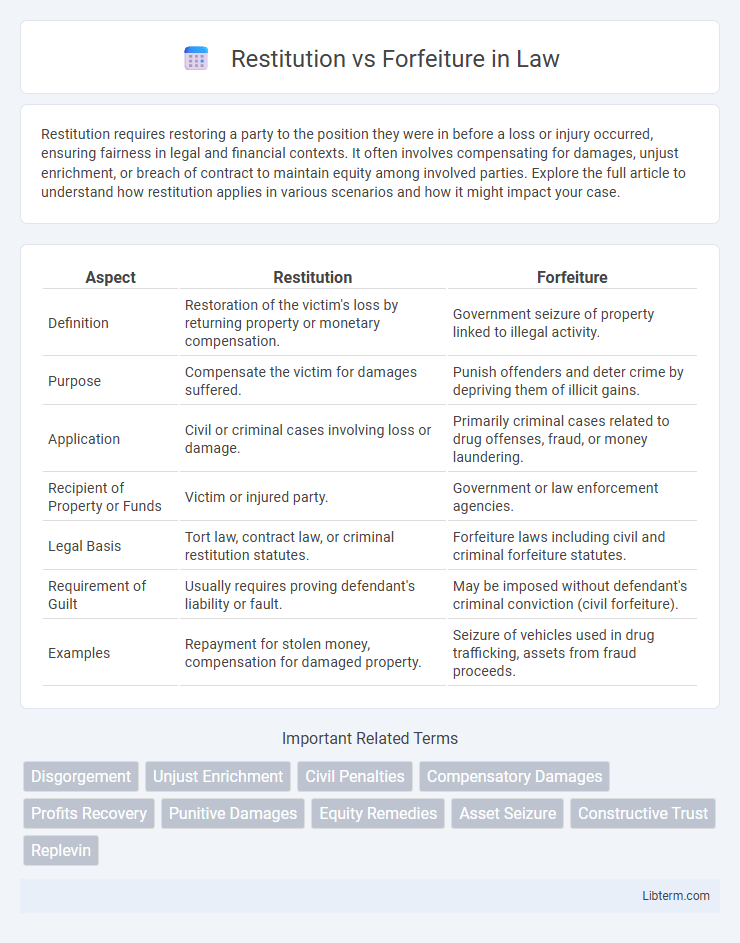Restitution requires restoring a party to the position they were in before a loss or injury occurred, ensuring fairness in legal and financial contexts. It often involves compensating for damages, unjust enrichment, or breach of contract to maintain equity among involved parties. Explore the full article to understand how restitution applies in various scenarios and how it might impact your case.
Table of Comparison
| Aspect | Restitution | Forfeiture |
|---|---|---|
| Definition | Restoration of the victim's loss by returning property or monetary compensation. | Government seizure of property linked to illegal activity. |
| Purpose | Compensate the victim for damages suffered. | Punish offenders and deter crime by depriving them of illicit gains. |
| Application | Civil or criminal cases involving loss or damage. | Primarily criminal cases related to drug offenses, fraud, or money laundering. |
| Recipient of Property or Funds | Victim or injured party. | Government or law enforcement agencies. |
| Legal Basis | Tort law, contract law, or criminal restitution statutes. | Forfeiture laws including civil and criminal forfeiture statutes. |
| Requirement of Guilt | Usually requires proving defendant's liability or fault. | May be imposed without defendant's criminal conviction (civil forfeiture). |
| Examples | Repayment for stolen money, compensation for damaged property. | Seizure of vehicles used in drug trafficking, assets from fraud proceeds. |
Definition of Restitution
Restitution is a legal principle requiring a party to compensate another for loss or injury caused by wrongful conduct, aiming to restore the injured party to their original position. It involves returning or reimbursing the value of benefits unjustly received or damages incurred. This remedy contrasts with forfeiture, which entails the loss of property or rights as a penalty for wrongdoing rather than compensation.
Definition of Forfeiture
Forfeiture is a legal process where a person's property is seized by the government due to its involvement in criminal activity or violation of laws. Unlike restitution, which aims to compensate victims for losses, forfeiture serves as a penalty to deprive offenders of assets gained through illegal means. Examples include asset forfeiture in drug trafficking cases and the forfeiture of property used to facilitate crimes.
Key Differences Between Restitution and Forfeiture
Restitution requires a wrongdoer to compensate a victim for losses caused by unjust enrichment or harm, emphasizing restoration of the victim's position before the wrongdoing. Forfeiture involves the government seizing property connected to illegal activity, focusing on depriving the wrongdoer of benefits gained through criminal conduct. The key difference lies in restitution's victim-centered compensation versus forfeiture's punitive confiscation by the state.
Legal Basis for Restitution
The legal basis for restitution centers on restoring the injured party to their original position by compelling the wrongdoer to return unjust gains or compensate for losses incurred, grounded in principles of equity and contract law. Restitution relies on proving a benefit was conferred and retained unjustly, often supported by statutes and case law that enforce fair compensation rather than punishment. Courts assess factors such as the enrichment of the defendant and the corresponding deprivation of the plaintiff to determine appropriate restitution remedies.
Legal Framework for Forfeiture
Forfeiture is governed by a robust legal framework that enables the government to seize property involved in criminal activities without necessarily requiring a conviction. Statutes such as the Civil Asset Forfeiture Reform Act and state-specific forfeiture laws outline procedures for identifying, seizing, and adjudicating assets linked to illicit conduct. This framework emphasizes due process rights, requiring the government to prove by a preponderance of the evidence that property is connected to unlawful actions before forfeiture is finalized.
Purpose and Objectives of Restitution
Restitution aims to restore the injured party to their original position by compensating for losses or damages suffered, emphasizing fairness and equitable recovery. Its primary objective is to prevent unjust enrichment of the wrongdoer and ensure that the victim receives reparations corresponding to the harm inflicted. Unlike forfeiture, which involves the government seizing assets linked to illegal activity, restitution directly addresses victim compensation and repairing harm.
Purpose and Objectives of Forfeiture
Forfeiture aims to deprive wrongdoers of assets obtained through illegal activities, ensuring these illicit gains do not benefit the offender. Its purpose is to deter criminal conduct by removing financial incentives and to disrupt criminal enterprises by seizing property connected to wrongdoing. Forfeiture supports law enforcement efforts by targeting the economic foundations of crime and reinforcing justice through the confiscation of unlawfully acquired assets.
Examples of Restitution Cases
Restitution cases often arise when a defendant is ordered to compensate a victim for financial losses resulting from fraud, theft, or breach of contract, such as in United States v. Bajakajian, where the court required repayment of illegally obtained funds. In cases involving embezzlement, offenders may be mandated to return stolen amounts to the victim, illustrating restitution's role in remedying economic harm. Restitution ensures that victims regain their losses by imposing a financial obligation on the responsible party, contrasting with forfeiture, which typically involves government seizure of assets linked to criminal activity.
Examples of Forfeiture Cases
Forfeiture cases often involve the seizure of assets connected to criminal activities, such as drug trafficking operations where authorities confiscate cash, vehicles, or real estate acquired through illegal profits. In white-collar crime contexts, forfeiture can include bank accounts or luxury items purchased with embezzled funds. High-profile cases, like the forfeiture of proceeds from insider trading or fraud schemes, demonstrate how courts aim to dismantle the financial benefits of criminal conduct.
Restitution vs Forfeiture: Practical Implications
Restitution involves compensating victims for losses directly caused by wrongdoing, emphasizing repairing harm and restoring the injured party to their original position. Forfeiture entails the government seizing assets connected to criminal activity, focusing on deterring illegal conduct rather than compensating victims. Practically, restitution requires clear proof of damage and often payment plans, while forfeiture proceedings typically involve asset seizure without the necessity of direct victim compensation.
Restitution Infographic

 libterm.com
libterm.com